Heat stress is a very serious situation for chickens and can quickly go from serious to deadly. Even when pulling out all the stops to keep our chickens safe in the heat, according to Gail Damerow in The Chicken Encyclopedia, “During long periods of extreme heat, hens stop laying and all chickens suffer stress. When temperatures reach 104° F (40° C) or above, chickens can’t lose excess heat fast enough to maintain a proper body temperature and may die.”

Among the many ways to combat heat stress that I covered in my blog post Beat the Heat, is supplementing their drinking water with electrolytes. I recommend keeping vitamins and electrolytes handy in a well stocked chicken first aid kit, but in an emergency, it is possible to make electrolytes with ingredients commonly found in most homes.
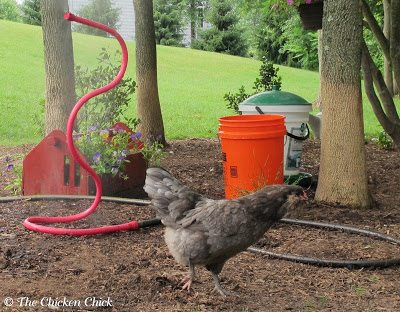
The mister was a bargain at less than ten dollars and keeps the surrounding area cool.
In temperatures over 90° F, keep a bucket or tub full of cool, water (not cold) near the flock at all times. If anyone begins to look overheated, panting, wings away from its sides, droopy, lethargic or pale in the wattles and comb, IMMEDIATELY submerge in the cool water up to its neck to bring its body temperature down. This simple measure can be lifesaving. Even if chickens are not in danger, this can be a welcome relief to chickens that would not voluntarily wade into water.
A dehydrated chicken may exhibit any or all of the following symptoms, which could result in death:
- panting or labored breathing
- pale comb and/or wattles
- spreading wings away from body
- diarrhea
- lethargy
- limpness
- unresponsive
- seizures,convulsions
Heat stress and dehydration deplete the body of electrolytes required for a chicken’s normal body functioning, therefore replenishing them is a priority when chickens suffer from heat stress and/or dehydration. The following instructions for making a homemade electrolyte solution can be found in The Chicken Encyclopedia.
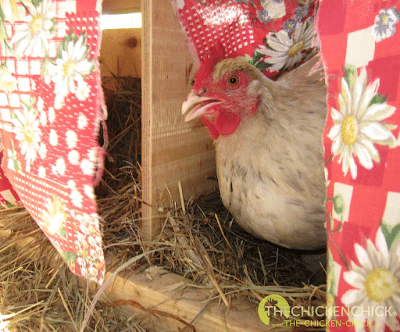
HOMEMADE ELECTROLYTE SOLUTION
INGREDIENTS
1/2 teaspoon potassium chloride (Morton salt substitute) (If you don’t have it, omit it)
1 teaspoon sodium bicarbonate (baking soda)
1 teaspoon sodium chloride (table salt)
1 tablespoon sucrose (sugar)
1 gallon water
ADVISORY: Electrolytes should not be given to healthy chickens who are not suffering from heat stress or dehydration.
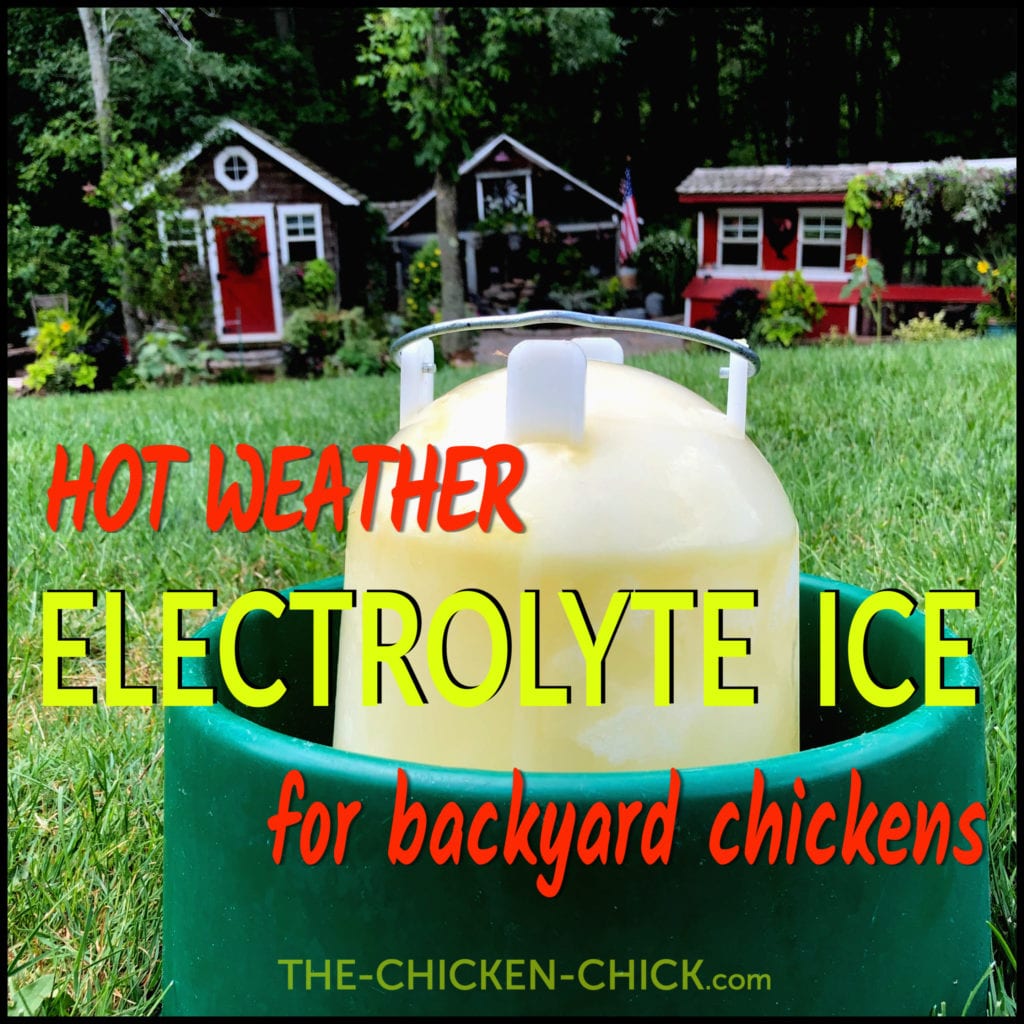
Mix up electrolytes in drinker & freeze overnight for a cold way to restore electrolyte balance in birds suffering from heat stress.
While we’re on the topic of heat advisories, it bears repeating that vinegar should NOT be added to drinking water during times of high heat. According to Dr. Mike Petrik, DVM, MSc, a poultry veterinarian, “Acidified water affects laying hens by making the calcium in her feed a little less digestible (based on chemistry….calcium is a positive ion, and dissociates better in a more alkaline environment). Professional farmers regularly add baking soda to their feed when heat stress is expected….this maintains egg shell quality when hens’ feed consumption drops due to the heat.”
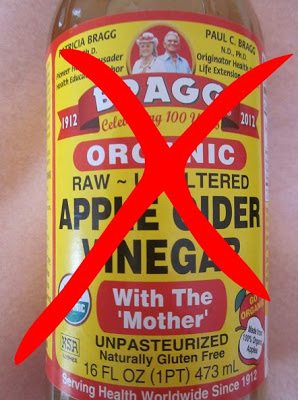
In summary, during high heat conditions, baking soda facilitates calcium absorption while vinegar inhibits it. SKIP the vinegar in the heat, opting for an electrolyte solution instead.
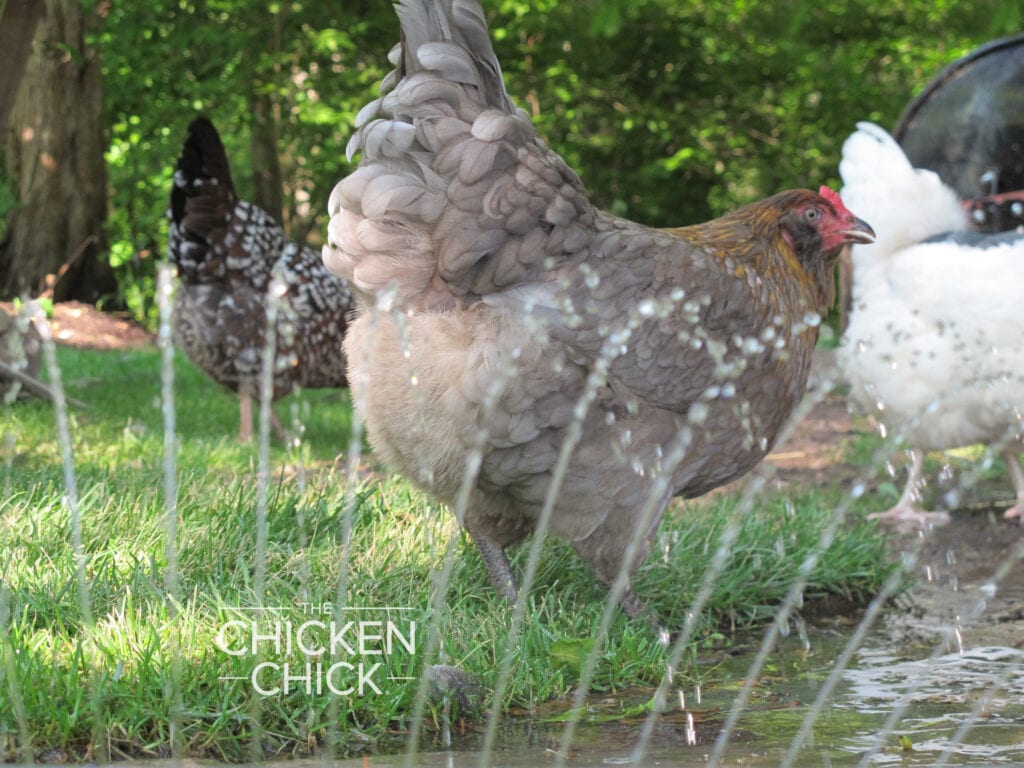
Kathy Shea Mormino
Affectionately known internationally as The Chicken Chick®, Kathy Shea Mormino shares a fun-loving, informative style to raising backyard chickens. …Read on


shop my SPONSORS
Heat stress is a very serious situation for chickens and can quickly go from serious to deadly. Even when pulling out all the stops to keep our chickens safe in the heat, according to Gail Damerow in The Chicken Encyclopedia, “During long periods of extreme heat, hens stop laying and all chickens suffer stress. When temperatures reach 104° F (40° C) or above, chickens can’t lose excess heat fast enough to maintain a proper body temperature and may die.”

Among the many ways to combat heat stress that I covered in my blog post Beat the Heat, is supplementing their drinking water with electrolytes. I recommend keeping vitamins and electrolytes handy in a well stocked chicken first aid kit, but in an emergency, it is possible to make electrolytes with ingredients commonly found in most homes.

The mister was a bargain at less than ten dollars and keeps the surrounding area cool.
In temperatures over 90° F, keep a bucket or tub full of cool, water (not cold) near the flock at all times. If anyone begins to look overheated, panting, wings away from its sides, droopy, lethargic or pale in the wattles and comb, IMMEDIATELY submerge in the cool water up to its neck to bring its body temperature down. This simple measure can be lifesaving. Even if chickens are not in danger, this can be a welcome relief to chickens that would not voluntarily wade into water.
A dehydrated chicken may exhibit any or all of the following symptoms, which could result in death:
- panting or labored breathing
- pale comb and/or wattles
- spreading wings away from body
- diarrhea
- lethargy
- limpness
- unresponsive
- seizures,convulsions
Heat stress and dehydration deplete the body of electrolytes required for a chicken’s normal body functioning, therefore replenishing them is a priority when chickens suffer from heat stress and/or dehydration. The following instructions for making a homemade electrolyte solution can be found in The Chicken Encyclopedia.

HOMEMADE ELECTROLYTE SOLUTION
INGREDIENTS
1/2 teaspoon potassium chloride (Morton salt substitute) (If you don’t have it, omit it)
1 teaspoon sodium bicarbonate (baking soda)
1 teaspoon sodium chloride (table salt)
1 tablespoon sucrose (sugar)
1 gallon water
ADVISORY: Electrolytes should not be given to healthy chickens who are not suffering from heat stress or dehydration.

Mix up electrolytes in drinker & freeze overnight for a cold way to restore electrolyte balance in birds suffering from heat stress.
While we’re on the topic of heat advisories, it bears repeating that vinegar should NOT be added to drinking water during times of high heat. According to Dr. Mike Petrik, DVM, MSc, a poultry veterinarian, “Acidified water affects laying hens by making the calcium in her feed a little less digestible (based on chemistry….calcium is a positive ion, and dissociates better in a more alkaline environment). Professional farmers regularly add baking soda to their feed when heat stress is expected….this maintains egg shell quality when hens’ feed consumption drops due to the heat.”

In summary, during high heat conditions, baking soda facilitates calcium absorption while vinegar inhibits it. SKIP the vinegar in the heat, opting for an electrolyte solution instead.















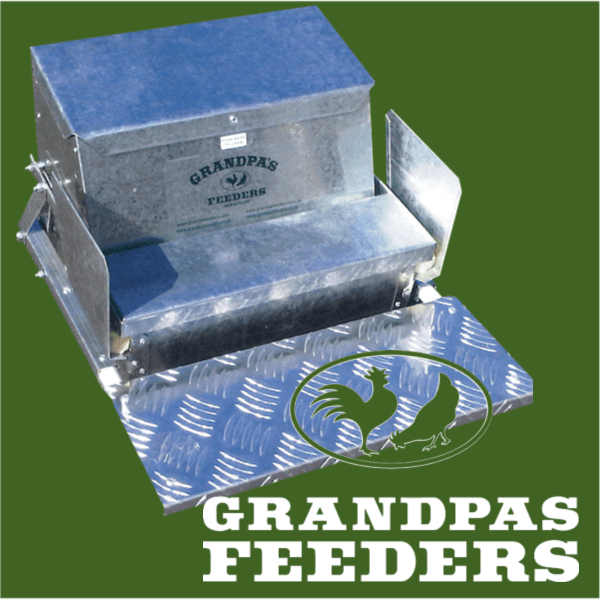


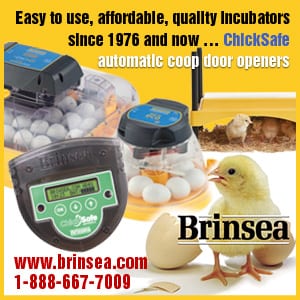



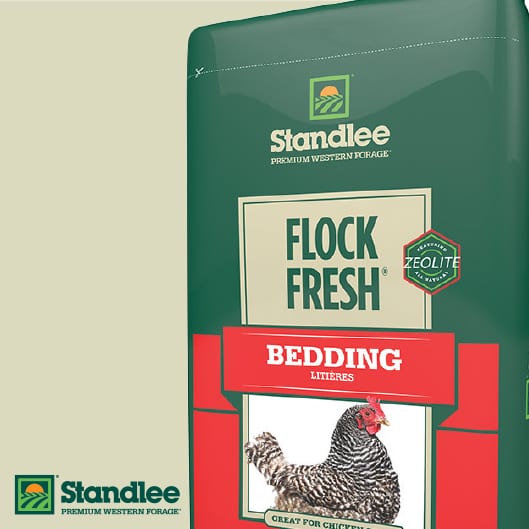
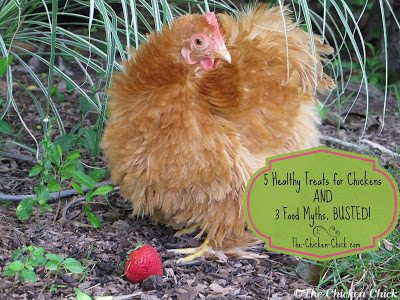
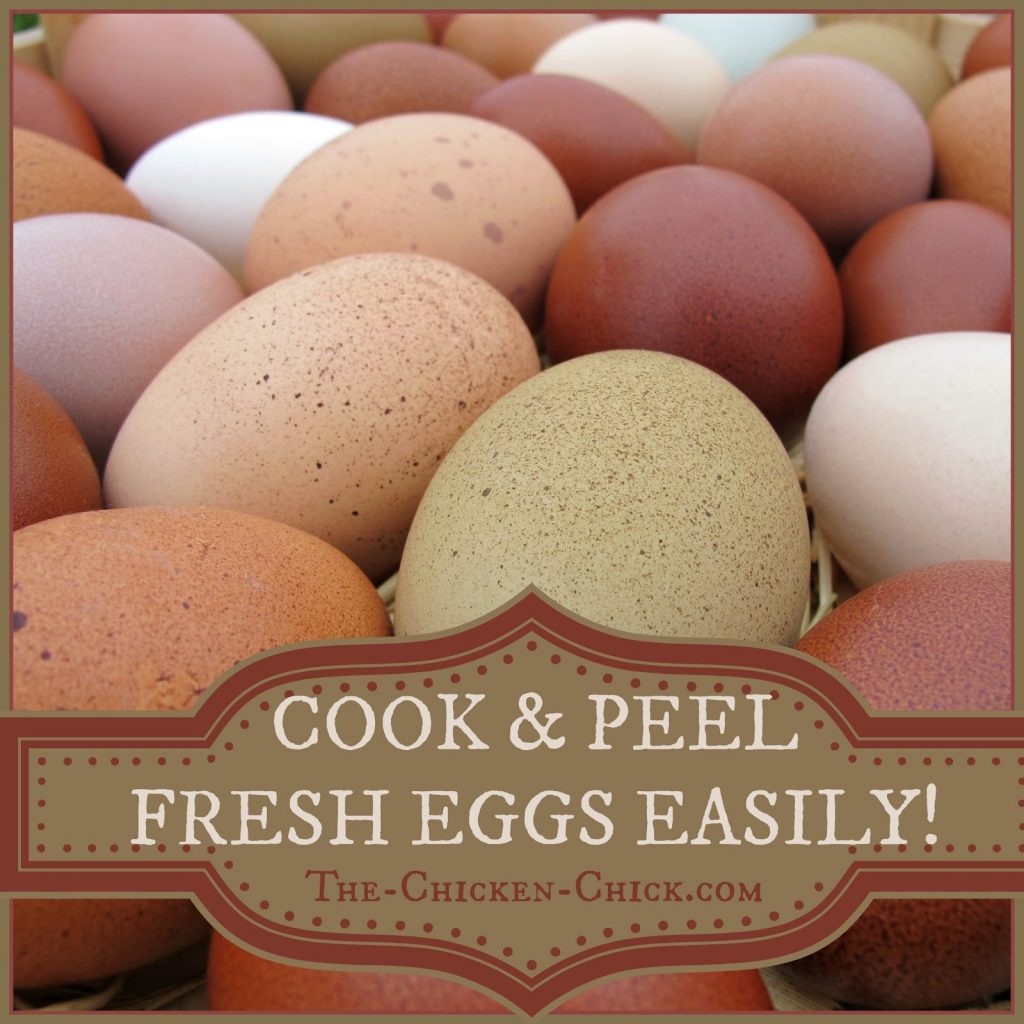














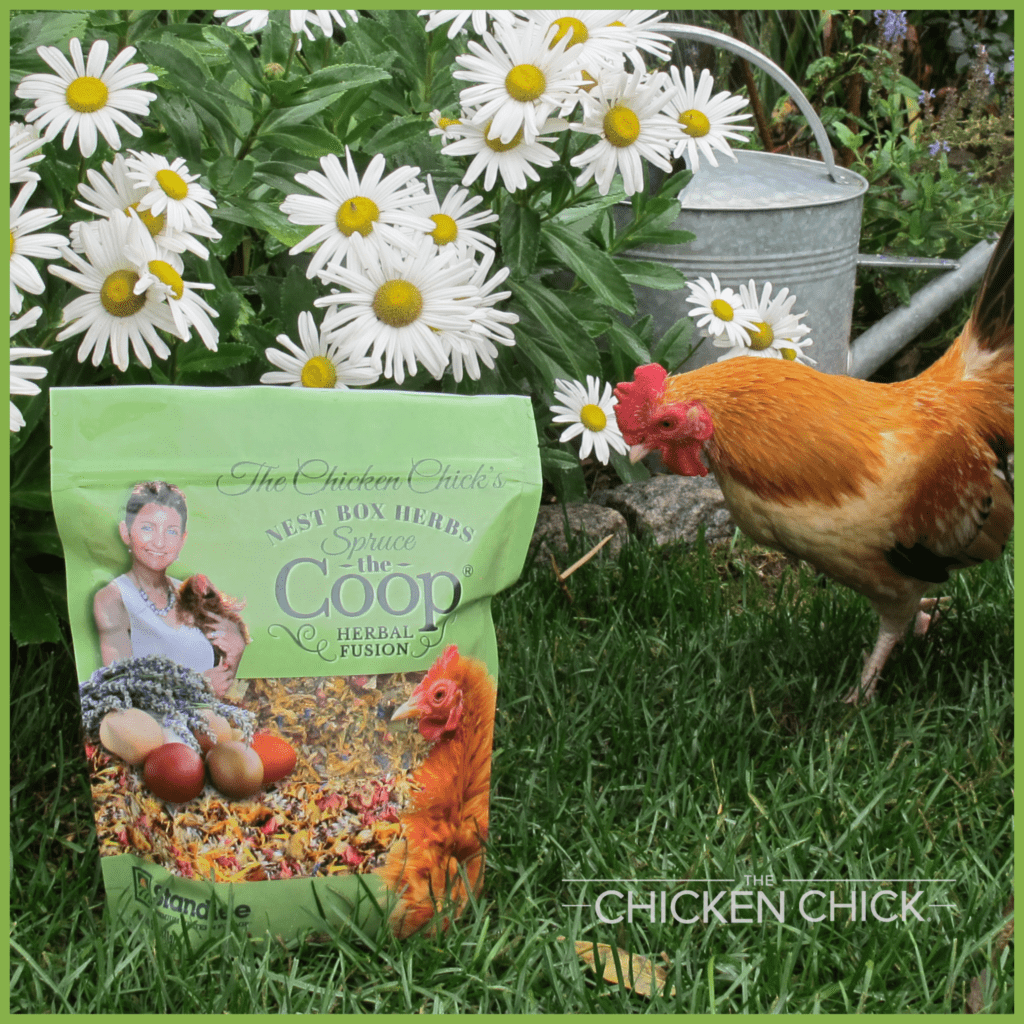

I made a TERRIBLE mistake. I have been raising healthy, happy chickens for four years. Three weeks ago, when giving my chickens new water I forgot to take the nozzle off the water that lets the water out. I realized this 5 days later when I went to refill. My chickens had no water for five days. UGH. I feel really lucky that they didn't go into convulsions or die. (I think only because they were already incredibly healthy). Now, they are still not laying eggs and one is going into molt. Do you have any advice on how to… Read more »
If you can't get her to a vet, I suggest putting her down. She is clearly suffering.
I have a Nankin Bantam hen that has injured her wing. We brought her into the garage when it was in the low 20's outside last week (it is in the 40's now). I finally found info on helping her wing, but she is getting weaker by the day. She is lethargic, has her beak open to breathe, and laying in runny droppings. I don't think it is a problem with heat, but should I give her electrolyte solution??
Because it will alter the normal electrolyte levels.
So our chicks will be three weeks old Sunday and have been giving them ACV it's like 80* some degrees and humid. What I am understanding from the reading is I should be is this correct? I also give them garlic once a week one clove for the four of them is that ok. New to all this. Also is it to earl to figure out if they are hens or roosters? ?